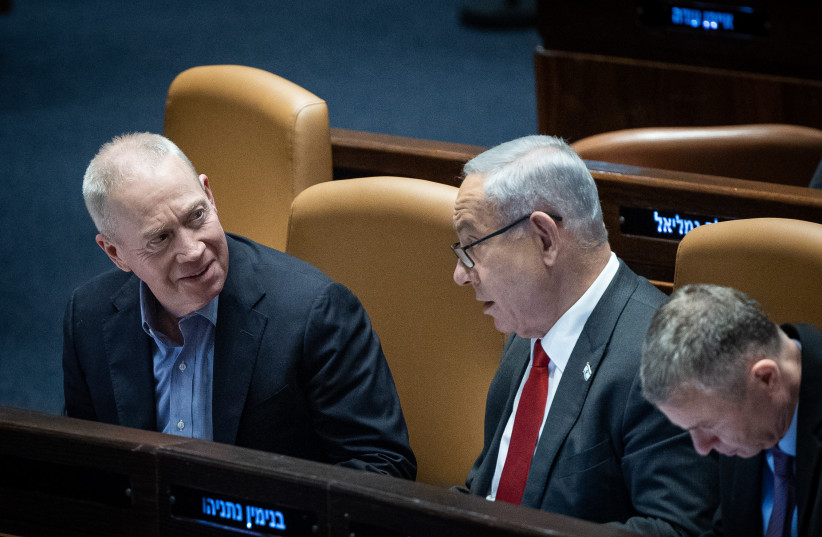From March 26 until Monday, Prime Minister Benjamin Netanyahu put the country through over a week of drama about the fate of Defense Minister Yoav Gallant.
Netanyahu announced his firing last Sunday but then never sent the formal letter that legally removes a minister from his position.
Moreover, once Netanyahu backtracked on Monday to pause the judicial overhaul to create more time for negotiations with the opposition – what Gallant had asked him to do – it became harder for him to justify the firing. In fact, the sacking itself was part of what set off even larger protests last Sunday night and Monday.
For several days, four different names of other Likudniks were leaked as Gallant’s likely replacements. There were also leaks that Gallant would only get to stay in office if he apologized.
Playing such games with one of the most critical defense posts was viewed by most security experts as a dangerous move during a time when Palestinian terror in the West Bank is explosive, the triangle of Iran-Hezbollah-Syria is more unstable than ever and the Islamic Republic is getting closer to a nuclear weapon.
Many commentators worried that Israel’s enemies might feel emboldened to attack during this period with the hope of finding a rattled IDF.

Only today did Netanyahu quietly – though there has still been no official public statement – leak to some media outlets that Gallant’s firing would be “paused” until the explosive security situation calms down.
And what exactly does that mean?
It certainly does not sound like Gallant has a chance to remain in his post until the end of this government’s term.
Actually, it sounds more like Gallant could still be fired in two weeks or two months if the security situation stabilizes in Netanyahu’s mind.
However, the security situation was just as bad on March 26, when he fired Gallant, as it is now.
So maybe translating the leak of Gallant’s firing being “paused” versus him being left fully in his position is that as soon as Netanyahu feels that he is less politically vulnerable, he will toss Gallant.
Of course, if Gallant gets to stay on and Netanyahu continues to feel politically vulnerable, maybe there will be a point where the prime minister decides to leave him in place for real, instead of merely pausing Gallant’s firing.
Some commentators are even suggesting that Gallant will get to stay on for an extended period, but that Netanyahu is using the phrase “pausing” his dismissal so as not to anger those in his coalition who hated Gallant and wanted him out.
The bottom line is that for every security decision or piece of advice Gallant makes or gives now, there will be a cloud over him about how whatever he may say or do will impact whether or not he gets to stay in his chair – as opposed to just focusing on the best interests of the country.
Further, he knows that when he crossed Netanyahu in favor of what he thought was the best interests of the country, that led to him getting fired, or sort of fired on pause.
In the meantime, Hezbollah recently set off an explosive device at Megiddo, Iran tried to attack Israel with a drone, Palestinian terror attacks from the West Bank are happening at such a rapid pace that it is hard to remember all of the ones that happened just a week or a month before without keeping a written list – and with almost zero attention from the West for the last month, Tehran continues to creep closer to a nuclear arsenal.
